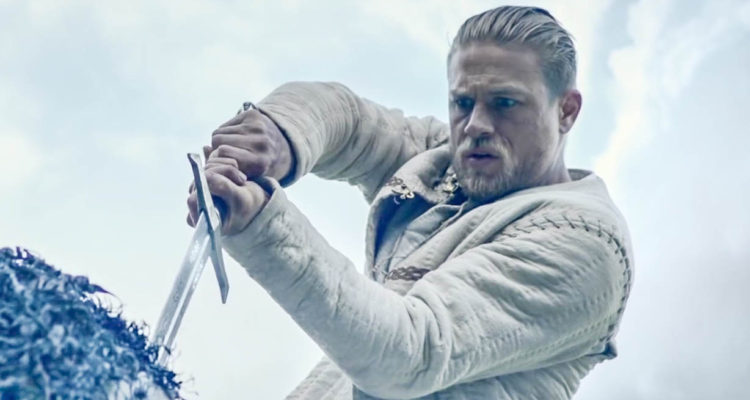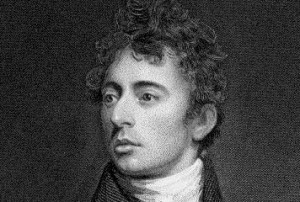King Arthur: Legend of the Sword
I guess Guy Ritchie’s new digitized entertainment King Arthur: Legend of the Sword has something to do with the legend of King Arthur, in the same way that Robin Hood has something to do with the flour sold under his name: There are characters in Ritchie’s production that are called by the same names as some characters in the Arthurian legend. Of course, they have no other similarity to those characters, nor does the plot, if that’s really a word one can use when discussing what is essentially a video game that we are meant to sit and watch, bear any actual resemblance to any story that Thomas Malory, Tennyson, or T.H. White ever told.
Ritchie, of course, is not the first to usurp Arthurian character names for a story exempt from any relationship with actual Arthurian tradition. Antoine Fuqua’s 2004 King Arthur, with Clive Owen in the title role, did that sort of thing—painfully turning the courtly Grail knight Sir Bors into a flatulent churl—but at least that film had the excuse that it wasn’t trying to work with Arthurian legend at all, but to present a story set in the political turmoil of the period when the historical precursor of Arthur emerged as a legendary Celtic hero. Ritchie’s film has no such intent. It seems his effort is bent on serving as an origin story for a new fantasy/superhero franchise, based, however loosely, on Arthurian legend. This is clear from the film’s conclusion, which seems to promise sequels to come (in fact there are actually six films planned). We can only pray that such an eventuality never occurs.
Where Ritchie and co-writers Joby Harold and Lionel Wigram seem to have got their notion of Arthur’s legend is anybody’s guess, but they do not seem to have gone beyond Disney’s Sword and the Stone—frankly one of Disney’s worst animated movies but still, as a contribution to Arthurian legend, head and shoulders above Ritchie’s travesty. From somewhere they seem to have become aware that Arthur was the son of King Uther Pendragon, that he grew up in obscurity and he proved himself the true king by pulling a sword from a stone. They also seem to have picked up something about that sword being special and blessed by a magical “Lady of the Lake.” Interestingly, they also seem to have heard somewhere that an evil king named Vortigern ruled Britain (though they call it England) sometime before Arthur, and that he wanted to build a tower. But these little factoids get so jumbled around in ways that have nothing to do with their position or significance within the legend that has come down to us that the mind boggles at what has been lost.
Here Vortigern is Uther’s brother and betrays him, having succumbed to what I can only think of as the dark side of the Force. Seems there is a race of Mages, of whom Merlin was one—we don’t get to see him, but apparently he originally gave the magic sword to Uther (the unfortunately wasted Eric Bana). But an evil Mage named Mordred (uh…isn’t he supposed to be Arthur’s son? Oh wait, we’re just playing with familiar names, I forgot) is trying to destroy Uther, but he defeats Mordred with the magic sword (inexplicably not called Excalibur, as far as I could tell), but then Uther is killed by a magically enhanced videogame version of Vortigern (played with malicious zeal by Jude Law, though even he can’t save this film). Vortigern is being advised by a kind of monster-octopus-thing with three human heads, who encourages him to kill his closest loved ones in exchange for power. So naturally he’s not exactly going to be a benevolent king. As for the sword—well, Uther throws it up in the air, it comes down embedding itself in his neck, and he turns into a stone, from which the sword needs to be pulled. I’m not making this up. And believe me when I say that this makes more sense than much of the rest of this movie. At least you can follow this part.
In the legend that has come down to us over a thousand years of telling and retelling, the young Arthur is spirited away at the death of his father and raised in obscurity by the good knight Sir Ector. But Ritchie knows better than the hundreds of previous writers who have worked in this tradition before, and has the young Arthur (Charlie Hunnam) raised in a brothel, in the old Roman city of Londinium, where he ultimately becomes leader of a small group of thugs. I suppose Ritchie finds it amusing to iconoclastically denigrate Arthur’s upbringing, or perhaps he thinks it makes the character more of a “regular guy” and so makes it easier for us to relate to him. Again, Ritchie is not the first to do this sort of thing. In Jerry Zucker’s 1995 film First Knight, Richard Gere as Lancelot is depicted as a kind of itinerant ne’er do well and squabbler until he catches on with Arthur’s court and catches the eye of Arthur’s queen. But even that generally execrable film knew enough to keep the basic outline of the Arthurian love story, so that it was recognizable as a contribution, however misguided, to the compendium of Arthurian legend.
Okay, fair warning: curmudgeonly rant coming up. Skip to next paragraph if you don’t want to hear it. I understand that one of the producers of Ritchie’s opus declared, “It’s not your father’s King Arthur,” and said it as if that is a good thing. This is essentially the reason why almost all filmed versions of the Arthurian legend have been dismal failures: the filmmaker is handed a complex story that has been told and retold over a thousand-year period and has remained popular for all those centuries because it is a great story about love, loyalty, nobility, courage, camaraderie, war, and the principles we live by that define our humanity—a story that appeals to the deepest heart of our being. And then the filmmaker says “Who cares about all this old stuff? I’m going to make the story my own!” You know what? If it’s not “your father’s King Arthur,” then that means it not going to be nearly as good as your father’s King Arthur. Ritchie’s film is worse than most because it so completely ignores the tradition, but it’s only the latest in a long string of abominations.
This is not to say that the story should simply be retold precisely as it always has been every time. It could not have survived so long if it weren’t reinterpreted and tweaked every generation or so to speak to current concerns. As the author of my own series of “Merlin mystery” novels, I have engaged in that kind of reframing myself. But if you examine the few successful Arthurian films—like John Boorman’s Excalibur, the film adaptation of Lerner and Loewe’s Camelot (itself based on T.H. White’s novel), and yes, Monty Python and the Holy Grail—you see that they are based on conventional versions of the story with events reinterpreted or characters’ motives reexamined or, in the case of Python create a spoof of medieval motifs with which the filmmakers are very familiar. This is a far cry from the hubris of ignorance so apparent in failed versions like the current one.
At this point I need to catch myself and ask, as my dear wife often does, whether I’m not ignoring the crucial question “is the movie good at what it’s good for.” In other words, if I forget about the Arthurian names and pretend that this is simply a kind of superhero action movie set in an imaginary Middle Ages that have nothing to do with Arthurian legend, is the film then worth seeing or not? And yes I can close my eyes and imagine it as a sort of bad episode of Game of Thrones—it has a similar darkness and foreboding tone, a similar worm’s eye view of the Middle Ages that deliberately contrasts Tolkien’s idealized view, and a similarly suspended disbelief in the forces of dark magic—but even then I’m afraid it just doesn’t work. Even a bad episode of Game of Thrones has a rationally constructed plot and characters whose motivations you can understand and follow. Here, aside from certain unexplained head scratchers, like the presence in Celtic Britain (or Saxon England—again, hard to tell when this is supposed to be going on) of Arthur’s Asian Kung Fu instructor (Tom Wu) and a rebel leader who is clearly African (Djimon Hounsou), there are times when it is difficult to know what on earth is going on. Ritchie will get to a point in the film when, say, Arthur and his new-found friends, hiding in the forest and planning rebellion like Robin Hood and his Merry Men (Ritchie apparently likes that story better, since there’s a lot more of that kind of thing than anything Arthurian here), and just when someone is about to make a point, the editing flashes forward to sometime in the future when apparently this plan is taking place, then back into the past when something happened that Arthur might be thinking about at the time. This frenetic editing causes consistent problems with coherence and continuity in the film.
This all culminates in a climax that is virtually inexplicable. What I’m about to say might be considered a spoiler, but I don’t think it really is because I honestly don’t know what I’m talking about. Here a mage (Astrid Berges-Frisbey) who has no name (maybe Ritchie and his fellow writers had not read enough of their fathers’ King Arthur to have heard of Morgan la Fay), and whose accented English suggests at times that she has no more idea of the meaning of what she is saying than the audience does, has a big snake bite Arthur on the neck, saying that the venom will cause him to see his future. Then he does a whole bunch of violent stuff and apparently we were supposed to understand that he really did all those things and wasn’t just foreseeing them. Or Ritchie just forgot what he was doing. Or the transition that would have made this make sense was edited out. I guess I could forgive this kind of ending if the whole movie wasn’t this way. But it was. So no, wifely voice of reason, I’m afraid this film really isn’t good at what it’s good for, and succeeds neither at what it is trying to be or what an audience might want it to be. I know that Ritchie really is just trying to make something that is visually “cool,” but seriously, at some point a movie has to make sense. Not only is this not your father’s King Arthur, it really shouldn’t be yours either. I’m giving this, yes, one Robert Southey on the Ruud movie meter. You’ll miss it if you have an ounce of sense.
If you want to know something about my own Arthurian tales click the link below:
[av_notification title=’Note’ color=’green’ border=” custom_bg=’#444444′ custom_font=’#ffffff’ size=’large’ icon_select=’yes’ icon=”]
Click here for book information:
knightsriddleflier-2
[/av_notification]


